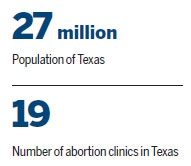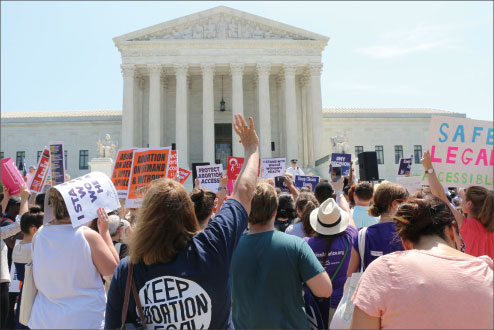Top court abortion ruling hailed, decried
Abortion rights advocates on Monday cheered a decision by the US Supreme Court that struck down restrictions to abortion access in Texas, calling it a major victory for women and predicting that similar laws are now endangered nationwide.
The high court ruled 5-3 that a Texas law imposing strict regulations on abortion doctors and facilities put an undue burden on women exercising their right to abortion, which has been legal in the United States since 1973.
Laws such as the Texas regulations are seen by critics as a backdoor way of restricting abortion access. Hardest hit are rural, poor women for whom distance and cost put abortions out of reach, they say.
The Texas law required abortion doctors to have admitting privileges, a formal affiliation that can be hard to obtain, at a hospital within 30 miles, and required clinics to have costly, hospital-grade facilities such as specified corridor width, floor tiles, parking spaces and elevator sizes.

"With today's Supreme Court ruling, I let out a big exhale," said Tracy Droz Tragos, director of the documentary film Abortion: Stories Women Tell, to be released in August by HBO. "At least for a moment, I am optimistic about the future of women in America."
Women have had their constitutional rights vindicated, said Nancy Northup, president of the Center for Reproductive Rights which represented the Texas clinics, in a statement.
"The Supreme Court sent a loud and clear message that politicians cannot use deceptive means to shut down abortion clinics," she said.
Texas claimed its law protected women's health, but critics said the regulations were medically unnecessary and intended to shut down clinics.
Writing the Supreme Court decision, Justice Stephen Breyer wrote: "We conclude that neither of these provisions offers medical benefits sufficient to justify the burdens upon access that each imposes."
"Each places a substantial obstacle in the path of women," he wrote.
Decrying the decision, anti-abortion groups such as the Susan B. Anthony List said Texas women will be unprotected from dangerous and unsanitary conditions.
"The abortion industry cannot be trusted to regulate itself and they know it," said Marjorie Dannenfelser, president of the List, which supports anti-abortion political candidates.
Making a similar argument, Kristan Hawkins, president of Students for Life of America, in a statement said abortion providers "prey on the vulnerabilities of women who are in desperate situations, placing their bottom line over the health and safety of the patients."
"And the US Supreme Court, in efforts to put the so-called 'right to abortion' above everything else, just let them get away with it," she said.
Since the restrictive law was passed in 2013, the number of abortion clinics in Texas, a state of 27 million people, dropped to 19 from 41.
Similar laws are likely to be struck down, experts said, in states with restrictions such as requiring women to make repeated visits or requiring ultrasounds for women seeking abortions and that the images be shown to them.
|
Supporters celebrate on Monday outside the US Supreme Court in Washington after the court struck down key provisions of Texas' regulation of abortion clinics. The justices voted 5-3 in favor of Texas clinics that argued that the regulations have made it difficult for women to have abortions in the state. The 2013 law in Texas and subsequent regulations required doctors who perform abortions to have admitting privileges at nearby hospitals and made clinics meet hospital-like standards for outpatient surgery. Chen Weihua / China Daily |



















